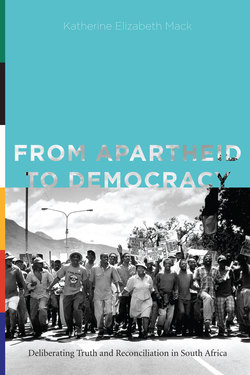From Apartheid to Democracy

Реклама. ООО «ЛитРес», ИНН: 7719571260.
Оглавление
Katherine Elizabeth Mack. From Apartheid to Democracy
Отрывок из книги
FROM APARTHEID TO DEMOCRACY
THE PENNSYLVANIA STATE UNIVERSITY
.....
From Apartheid to Democracy conceives of the South African TRC as a rhetorical event in three specific senses of the term “rhetorical,” none of which precludes the others. First, the TRC was premised on arguments about the dunamis (power, potential) of language as described above—rhetoric as constitutive. Second, the Commission’s architects, and subsequently the Commission itself, sought to persuade various publics of language’s transformative effects so as to stave off calls for other forms of dealing with the past and to facilitate South Africa’s (relatively) nonviolent transition—rhetoric as persuasion. Third, and most centrally for this project, the TRC sought to generate “public debate, public participation and criticism” (TRC, Report 1: 104)—rhetoric as argument. A rhetorical approach to the TRC yields an intriguing set of questions: How does a truth commission promote identification amid competing truth claims and arguments occurring at different points of stasis? In a civic setting that is premised on the sharing of personal stories, what relates and separates the rhetorics of the civic and the personal? How do the dynamics between the participants in a truth commission process, and the constraints produced by their ideological and sociohistorical contexts, construct this novel rhetorical situation? Which of the Commission’s arguments did different South African publics seek to contest, and how did these publics voice their counterarguments within the public hearings? Finally, how did this argumentation continue both beyond and outside of the Commission’s formal process in genres not typically perceived as rhetorical, such as the novel and the photographic essay?
From Apartheid to Democracy joins a lively scholarly conversation about the TRC. Some studies of the Commission use empirical methods, employing “rigorous and systematic social science methods” (Gibson 3) or “more comprehensive and scientific assessment” (Chapman and Van der Merwe viii), to determine whether the TRC was a success. As their titles imply, Overcoming Apartheid: Can Truth Reconcile a Divided Nation? (Gibson) and the edited collection Truth and Reconciliation in South Africa: Did the TRC Deliver? (Chapman and Van der Merwe) exemplify this vein of scholarship.4 These empirical studies do a certain kind of work, but a rhetorical mode of analysis is especially suitable for a rhetorical situation. From Apartheid to Democracy’s rhetorical approach answers the question of the TRC’s “success” by arguing that the Commission provoked contentious debate and thus contributed to the creation of an agonistic deliberative public sphere. Here I draw both on political theorist Leigh A. Payne’s claim that “contentious debate enhances democratic practices by provoking political participation, contestation, and competition” (3) and on rhetorician Patricia Roberts-Miller’s positive valuation of agonistic over irenic deliberation. In contrast to irenic deliberation, which strives toward consensus and thus has the tendency to stifle disagreement and critical perspectives, agonistic deliberation “raises interesting questions, brings up injustices, or draws attention to points of view that had been obscured” (Miller 12). In the absence of absolute knowledge of the good, just, or right—that is, in the world of contingent human affairs as opposed to that of certain a priori truths—agonistic deliberation creates the optimal conditions in which to think through issues and determine courses of action.5
.....